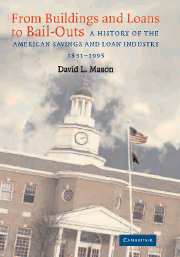 From Buildings and Loans to Bail-Outs
From Buildings and Loans to Bail-Outs Published online by Cambridge University Press: 29 October 2009
In contrast to the case study of Empire Savings and Loan Association of Mesquite, Texas, an analysis of Medford Co-operative Bank (MCB) provides an instructive example of how many thrifts survived the era of deregulation. MCB, like hundreds of savings and loans, began business in the late nineteenth century with the mission of helping people of modest means save for the future and become homeowners. Located in a suburb of a large urban center, this small association grew steadily, and over time developed a conservative business style that made it appear stodgy and resistant to change. While such characteristics were positive attributes that benefited MCB through the 1960s, by the 1970s some within the thrift saw them as liabilities.
Nonetheless, MC Bdealt remarkably well with the challenges of the 1980s. The main reason why it thrived when others failed is that management found ways to incorporate change while at the same time adhering to their traditional focus of serving the local community. This practice of “sticking to the knitting” meant that MCB's management was conservative but open to innovation, provided such changes complemented existing business lines and enhanced customer service. Furthermore, when it did enter into new business areas, the thrift did so cautiously, which gave it the opportunity to evaluate the results. In the 1990s, MCB made a number of significant changes, including conversion to a stock association and expansion into commercial lending, but the outlook of its leaders did not change.
To save this book to your Kindle, first ensure no-reply@cambridge.org is added to your Approved Personal Document E-mail List under your Personal Document Settings on the Manage Your Content and Devices page of your Amazon account. Then enter the ‘name’ part of your Kindle email address below. Find out more about saving to your Kindle.
Note you can select to save to either the @free.kindle.com or @kindle.com variations. ‘@free.kindle.com’ emails are free but can only be saved to your device when it is connected to wi-fi. ‘@kindle.com’ emails can be delivered even when you are not connected to wi-fi, but note that service fees apply.
Find out more about the Kindle Personal Document Service.
To save content items to your account, please confirm that you agree to abide by our usage policies. If this is the first time you use this feature, you will be asked to authorise Cambridge Core to connect with your account. Find out more about saving content to Dropbox.
To save content items to your account, please confirm that you agree to abide by our usage policies. If this is the first time you use this feature, you will be asked to authorise Cambridge Core to connect with your account. Find out more about saving content to Google Drive.